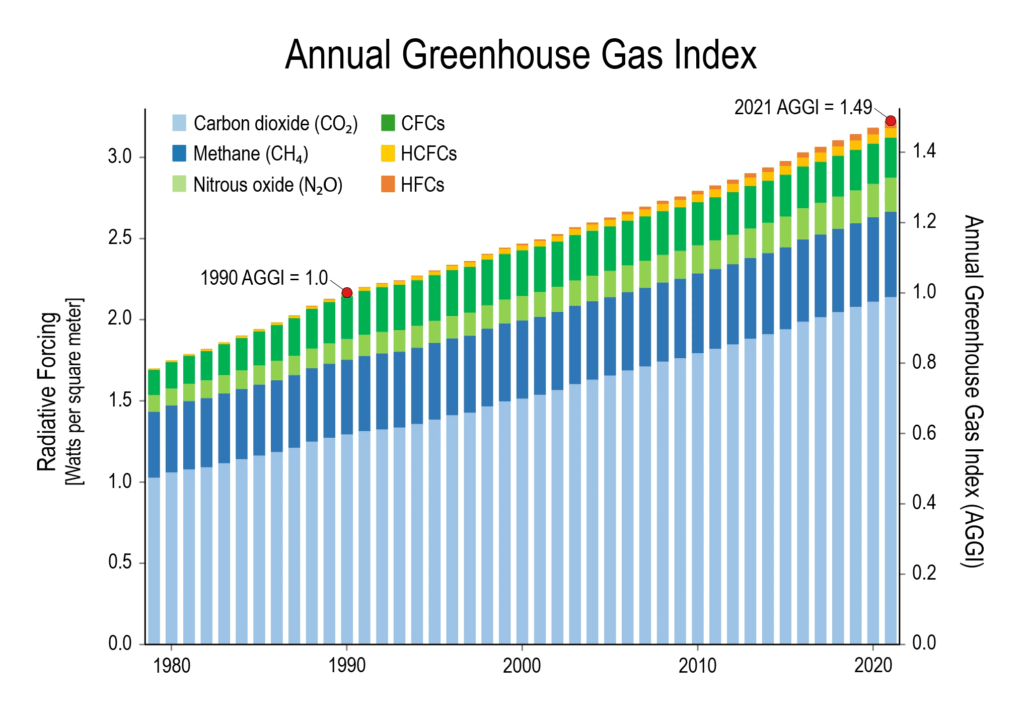EFFECTS OF GREENHOUSE GASES

In this article let’s see in detail about Effects of Greenhouse gases and its Sources.
GREENHOUSE GASES:
What are greenhouse gases?
Many chemical compounds in the atmosphere act as greenhouse gases. These gases allow sunlight (shortwave radiation) to freely pass through the Earth’s atmosphere and heat the land and oceans. The warmed Earth releases this heat in the form of infrared light (longwave radiation), invisible to human eyes. Some of the infrared light released by the Earth passes through the atmosphere back into space.

Greenhouse Effect:
However, greenhouse gases will not let all the infrared light pass through the atmosphere. They absorb some and radiate it back down to the Earth. This phenomenon, called the greenhouse effect, is naturally occurring and keeps the Earth’s surface warm. It is vital to our survival on Earth. Without the greenhouse effect, the Earth’s average surface temperature would be about 60° Fahrenheit colder, and our current way of life would be impossible.
Greenhouse gases occur naturally and allow us to survive on Earth by warming air near Earth’s surface. Human activities are now increasing the amount of greenhouse gases in the atmosphere, which leads to changes in climate. These changes are affecting many human activities, including agriculture.
Greenhouse gases examples:
Many greenhouse gases occur naturally in the environment, such as water vapor, carbon dioxide, methane, nitrous oxide, and ozone. Others such as hydrofluorocarbons (HFCs), perfluorocarbons (PFCs), and sulfur hexafluoride (SF6) are created and emitted solely through human activities. Human activities also add significantly to the level of naturally occurring greenhouse gases.
Source Of Greenhouse Gases:
The Natural Greenhouse Effect:
Sunlight enters the Earth’s atmosphere, passing through the greenhouse gases. As it reaches the Earth’s surface, land, water, and biosphere absorb the sunlight’s energy. Once absorbed, this energy is sent back into the atmosphere. Some of the energy passes back into space, but much of it remains trapped in the atmosphere by the greenhouse gases. This is the completely natural process and without these gases all the heat would escape back into space and Earth’s average temperature would be about 30 degrees Celsius (54 degrees Fahrenheit) colder. The greenhouse effect is very important process, because without the greenhouse effect, the Earth would not be warm enough for humans to live. But if the greenhouse effect becomes stronger, it could make the Earth warmer than usual. Even a little extra warming may cause problems for humans, plants, and animals.

The Enhanced Greenhouse Effect:
Some human activities also produce greenhouse gases and these gases keep increasing in the atmosphere. The change in the balance of the greenhouse gases has significant effects on the entire planet. Burning fossil fuels – coal, oil and natural gas – releases carbon dioxide into the atmosphere. Cutting down and burning trees also produces a lot of carbon dioxide. A group of greenhouse gases called the chlorofluorocarbons have been used in aerosols, such as hairspray cans, fridges and in making foam plastics.
Global Warming:
Since there are more and more greenhouse gases in the atmosphere, more heat is trapped, which makes the Earth warmer. This is known as Global Warming.

A lot of scientists agree that man’s activities are making the natural greenhouse effect stronger. If we carry on polluting the atmosphere with greenhouse gases, it will have very dangerous effects on the Earth. Today, the increase in the Earth’s temperature is increasing with unprecedented speed. To understand just how quickly global warming is accelerating, consider that during the entire 20th century, the average global temperature increased by about 0.6 degrees Celsius (slightly more than 1 degree Fahrenheit). Using computer climate models, scientists estimate that by the year 2100 the average global temperature will increase by 1.4 degrees to 5.8 degrees Celsius (approximately 2.5 degrees to 10.5 degrees Fahrenheit).
Greenhouse gases caused by Human Activities:

The principal greenhouse gases that enter the atmosphere because of human activities are:
• Carbon Dioxide (CO2): Carbon dioxide enters the atmosphere through the burning of fossil fuels (oil, natural gas, and coal), solid waste, trees and wood products, and also as a result of other chemical reactions (e.g., manufacture of cement). Carbon dioxide is also removed from the atmosphere (or “sequestered”) when it is absorbed by plants as part of the biological carbon cycle.
• Nitrous Oxide (N2O): Nitrous oxide is emitted during various agricultural and industrial activities, as well as during combustion of fossil fuels and solid waste.
• Methane (CH4): Methane is emitted during the production and transport of coal, natural gas, and oil. Methane is also emitted when organic waste decomposes, whether in landfills or in connection with livestock farming.
• Fluorinated Gases: Hydrofluorocarbons, perfluorocarbons, and sulfur hexafluoride are synthetic, powerful greenhouse gases that are emitted from a variety of industrial processes. Fluorinated gases are sometimes used as substitutes for ozone-depleting substances (i.e., CFCs, HCFCs, and halons). These gases are typically emitted in smaller quantities, but because they are potent greenhouse gases, they are sometimes referred to as High Global Warming Potential gases (“High GWP gases”).
EFFECTS OF GREENHOUSE GASES:
Global Warming Effects
With more heat trapped on Earth, the planet will become warmer, which means the weather all over Earth will change. Since the conditions we are living in are perfect for life, a large rise in temperature could be disastrous for us and for any other living creatures on Earth. At the moment, it is difficult for scientists to say how big the changes will be and where the worst effects will occur. These are some of the assumptions.
Effects of Global Warming
The Weather:
The effects will vary in different parts of the world: some places will become drier and others will become wetter. Although most areas will be warmer, some areas will become cooler. There may be many storms, floods and drought, but we do not know which areas of the world will be affected. All over the world, these weather changes will affect the kinds of crop that can be grown. Plants, animals, and even people may find it difficult to survive in different conditions.
Sea Levels:
Higher temperatures will make the water of the seas and oceans expand. Ice melting in the Antarctic and Greenland will flow into the sea. All over the world, sea levels may rise, perhaps by as much as 20 to 40 cm, by the beginning of the next century. Higher sea levels will threaten the low-lying coastal areas of the world, such as the Netherlands and Bangladesh. Throughout the world, millions of people and areas of land will be at danger from flooding. Many people will have to leave their homes and large areas of farmland will be ruined because of floods.
Farming:
The changes in the weather will affect the types of crops grown in different parts of the world. Some crops, such as wheat and rice, grow better in higher temperatures, but other plants, such as maize and sugarcane, do not. Changes in the amount of rainfall will also affect how many plants grow. The effect of a change in the weather on plant growth may lead to some countries not having enough food. Brazil, parts of Africa, south-east Asia, and China will be affected the most and many people could suffer from hunger.
Plants & Animals:
It has taken millions of years for life to become used to the conditions on Earth. As weather and temperature changes, the homes of plants and animals will be affected all over the world. For example, polar bears and seals will have to find new land for hunting and living if the ice in the Arctic melts. Many animals and plants may not be able to cope with these changes and could die. This could cause the loss of some animal and plant species in certain or all areas of the world.
People:
The changes in climate will affect everyone, but some populations will be at greater risk. For example, countries whose coastal regions have a large population, such as Egypt and China, may see whole populations move inland to avoid flood risk areas. The effect on people will depend on how well we can adapt to the changes and how much we can do to reduce climate change in the world.
EFFECTS OF GREENHOUSE GASES – Impact of Climate Change on Global Public Health

However, the health effects of a rapidly changing climate are likely to be overwhelmingly negative, particularly in the poorest communities, which have contributed least to greenhouse gas emissions. Some of the health effects include increase in frequencies of heatwaves, shortages in supplies of freshwater, rise in temperatures followed by variable precipitation, which are likely to decrease the production of staple foods in many of the poorest regions, rising sea levels, and prolongation of seasons for transmission of important vector-borne disease, as well as the alteration of their geographical range. Effects of greenhouse gases and climate change may lead to increased risks of:
- Water-borne disease
- Malnutrition
- Coastal flooding
- Huge population displacement and
- New diseases moving into the regions which lack either population immunity or a strong public health infrastructure.
LIKE WHAT YOU’RE READING?
CHECK OUT SOME OF OUR OTHER GREAT CONTENT HERE
- SOLID WASTE MANAGEMENT
- AERATION IN WASTEWATER TREATMENT
- HOW TO REDUCE FUEL CONSUMPTION?
- WHAT ARE THE COMPONENTS OF CELLULAR MEMBRANE?




Good web site! I truly love how it is easy on my eyes and the data are well written. I am wondering how I could be notified whenever a new post has been made. I’ve subscribed to your RSS which must do the trick! Have a nice day!